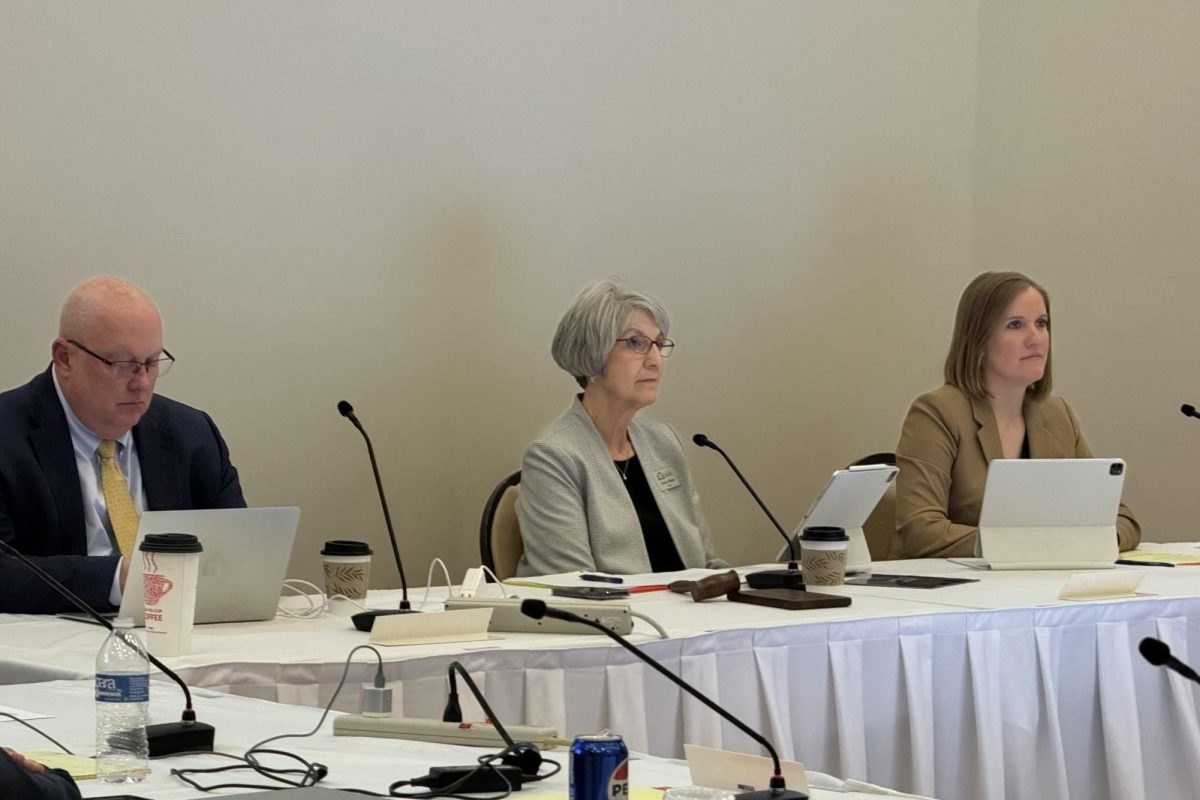Iowa legislature introduces eight anti-LGBTQIA+ laws in past week
February 9, 2020
Within the past week, eight new anti-LGBTQIA+ bills have been introduced into the Iowa legislature by various Iowa legislators.
“We knew we had not seen the end of legislation which targets LGBTQ Iowans,” said Courtney Reyes, executive director for One Iowa Action. “Once again, instead of concentrating on jobs, infrastructure or education, they are focused on stripping rights and access to information from Iowans.”
HF2201 was introduced on Jan. 31 by Rep. Sandy Salmon, Rep. Jeff Shipley, Rep. Dean Fisher, Rep. Terry Baxter, Rep. Phil Thompson, Rep. David Kerr, Rep. Tom Jeneary, Rep. Steven Holt, Rep. Skyler Wheeler, Rep. Thomas Gerhold, Rep. Tedd Gassman, Rep. Anne Osmundson and Rep. Jon Jacobsen.
This bill requires school districts to provide notification and information relating to, and allows pupils to be excused from, any program, curriculum, material, test, survey, questionnaire, activity, announcement, promotion or instruction of any kind relating to sexual orientation or gender identity.
A subcommittee was created for this bill on Feb. 6, with the subcommittee including Rep. Tom Moore, Rep. Art Staed and Salmon.
HF2202 was introduced on Jan. 31 by Rep. Stan Gustafson, Salmon, Shipley, Fisher, Baxter, Kerr, Jeneary, Holt, Wheeler, Gerhold, Gassman, Osmundson and Jacobsen.
This bill provides that, notwithstanding a specified provision of state law to the contrary, a public or nonpublic high school student shall only participate in an extracurricular interscholastic athletic practice, contest or competition that is designated for the student’s biological sex as determined at birth.
SF2130 was introduced on Jan. 31 by Sen. Dennis Guth.
This bill provides for the existence of fraudulent concealment of sexual orientation at the time of a marriage as a factor, in a dissolution action, in determining the custody arrangement that is in the best interest of a child of the parties.
Fraudulent concealment of sexual orientation is evidenced by nondisclosure or misrepresentation of a party’s sexual orientation, at the time of the marriage to the other party, on the party’s application form for a marriage license and on the party’s license to marry.
A subcommittee was created for this bill on Feb. 6, with the subcommittee including Sen. Jake Chapman, Sen. Tony Bisignano and Sen. Annette Sweeney.
HF2273 was introduced on Feb. 7 by Salmon, Shipley, Fisher, Kerr, Wheeler, Gerhold, Gassman and Jacobsen.
This bill establishes the “Protecting Freedom of Conscience from Government Discrimination Act” and provides definitions.
The bill provides that the sincerely held religious beliefs and moral convictions protected by the bill include: marriage is or should be recognized as the union of one man and one woman; the terms “male” and “female” refer to distinct and immutable biological sexes that are determinable by anatomy and genetics by the time of birth; and an unborn child is recognized as fully human from the moment of conception and life should be sacred and valued from the moment of conception.
The bill provides that notwithstanding any law to the contrary, the state shall not take any discriminatory or adverse action against a person, wholly or partially, on the basis that such person takes certain actions, as specified in the bill, based upon the sincerely held religious beliefs and moral convictions protected by the bill.
The certain actions specified in the bill are the following:
a. Solemnizes or declines to solemnize any marriage, or provides or declines to provide services, accommodations, facilities, goods or privileges for a purpose related to the solemnization, formation, celebration or recognition of any marriage, based upon or in a manner consistent with a sincerely held religious belief or moral conviction.
b. Makes any employment-related decision including but not limited to a decision whether or not to hire, terminate or discipline another person whose conduct or religious beliefs are inconsistent with those of the person, based upon or in a manner consistent with a sincerely held religious belief or moral conviction.
c. Makes any decision concerning the sale, rental, occupancy or terms and conditions of occupying a dwelling or other housing under the person’s control, based upon or in a manner consistent with a sincerely held religious belief or moral conviction.
d. Advertises, provides or facilitates adoption or foster care, when the person has provided or declined to provide any adoption, foster care or related service based upon or in a manner consistent with a sincerely held religious belief or moral conviction.
e. Guides, instructs, or raises a child, who has been placed in the care or custody of the person as a foster or adoptive child, based upon or in a manner consistent with a sincerely held religious belief or moral conviction.
f. Declines to participate in the provision of treatments, counseling or surgeries related to sex reassignment or gender identity transitioning or declines to participate in the provision of psychological, counseling or fertility services based upon or in a manner consistent with a sincerely held religious belief or moral conviction.
g. Establishes sex-specific standards or policies concerning employee or student dress or grooming, or concerning access to restrooms, spas, baths, showers, dressing rooms, locker rooms or other intimate facilities or settings, based upon or in a manner consistent with a sincerely held religious belief or moral conviction.
h. If the person is a state employee, lawfully speaks or engages in expressive conduct based upon or in a manner consistent with a sincerely held religious belief or moral conviction, if any of the following applies:
The state employee’s speech or expressive conduct occurs in the workplace, and the speech or expressive conduct is consistent with the time, place, manner and frequency of any other expression of a religious, political or moral belief or conviction allowed.
The state employee’s speech or expressive conduct occurs outside the workplace, and the speech or expressive conduct is in the employee’s personal capacity and outside the course of performing work duties.
i. If the person is employed by or acting on behalf of the state and is authorized to license marriages seeks recusal from licensing legally valid marriages based upon or in a manner consistent with a sincerely held religious belief or moral conviction. Any person making such recusal shall provide prior written notice to the state registrar of vital statistics who shall keep a record of such recusal. The person providing such a recusal shall take all necessary steps to ensure that the licensing of any legally valid marriage is not impeded or delayed as a result of any recusal.
If the person is employed by or acting on behalf of the state and is authorized to perform or solemnize marriages including but not limited to judges, magistrates, justices of the peace or their deputies, and seeks recusal from performing or solemnizing lawful marriages based upon or in a manner consistent with a sincerely held religious belief or moral conviction. Any person providing such a recusal shall provide prior written notice to the state court administrator. The state court administrator shall take all necessary steps to ensure that the performance or solemnization of any legally valid marriage is not impeded or delayed as a result of any recusal.
j. Refuses to perform, assist or participate in a medical procedure which will result in an abortion in accordance with chapter 146 based upon or in a manner consistent with a sincerely held religious belief or moral conviction.
SF2193 was introduced on Feb. 6 by Guth.
This bill is the same as HF2273.
SF2194 was introduced on Feb. 6 by Guth.
This bill is the same as HF2273 and SF2193 except it includes the word “professional” in the title of the act.
HF2274 was introduced on Feb. 7 by Shipley.
This bill requests that the legislative council establish a study committee of 10 members for the 2020 interim to examine the outcomes of the inclusion of “gender identity” as a protected class under Code chapter 216, the Iowa civil rights Act of 1965, in 2007.
The goal of the study committee shall be to engage in rigorous examination and expansive dialogue regarding issues relating to gender identity in order to end the tragedy of suicide by transgender individuals in Iowa.
HF2272 was introduced on Feb. 7 by Baxter, Fisher, Salmon, Gassman, Jeneary, Wheeler and Jacobsen.
This bill includes provisions relating to practices undertaken to cause a minor to physically appear more like a person of the opposite sex and less like the minor’s own sex, or to conform to a gender identity incongruent with the minor’s sex. The bill contains findings regarding the harms and ineffectiveness of such practices and contains definitions used in the bill.
The bill makes it unlawful for a medical professional to perform interventions or surgical procedures specified in the bill on a minor, and subjects a medical professional to disciplinary action and civil penalties for providing the prohibited treatments to or performing surgical procedures on a minor unless the treatment occurs based on the good-faith medical decision of a parent of a minor born with a medically verifiable genetic disorder of sexual development.
The interventions or surgical procedures specified in the bill include:
a. Performing a surgery that sterilizes, including castration, vasectomy, hysterectomy, oophorectomy, metoidioplasty, orchiectomy, penectomy, phalloplasty and vaginoplasty.
b. Performing a mastectomy.
c. Administering or supplying the following medications that induce transient or permanent infertility: Puberty-blocking medication to stop or delay normal puberty. Supraphysiological doses of testosterone or other androgens to members of the female sex. Supraphysiological doses of estrogen or synthetic compounds with estrogenic activity to members of the male sex.
d. Removing any otherwise healthy or non-diseased body part or tissue.
According to One Iowa Action, these eight bills are part of 13 bills that have been introduced by the Iowa legislature in this session alone.
“LGBTQ Iowans are just like anyone else,” Reyes said. “They deserve to raise their children, get a quality education, and compete in extracurricular activities. We urge the Iowa legislature to start focusing on how we can include everyone rather than focusing on which Iowans to exclude.”

















